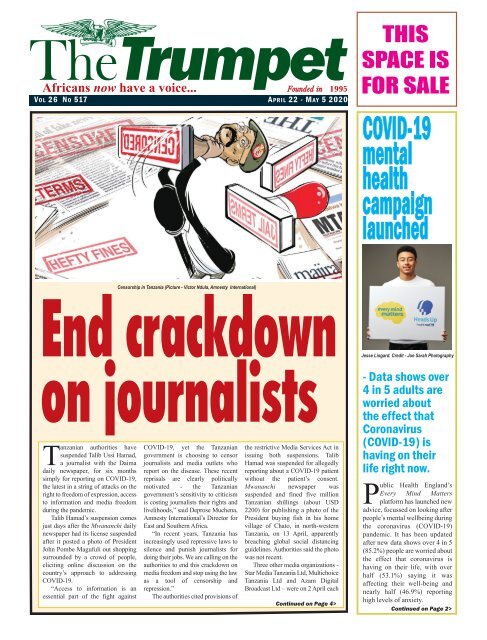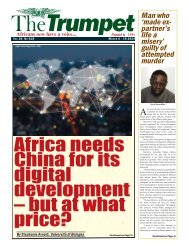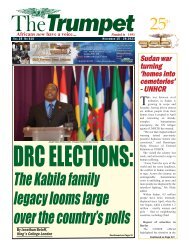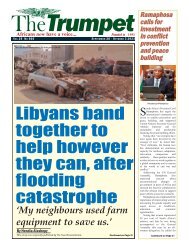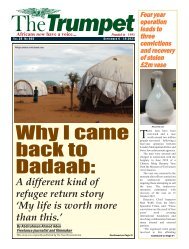The Trumpet Newspaper Issue 517 (April 22 - May 5 2020)
End crackdown on journalists
End crackdown on journalists
You also want an ePaper? Increase the reach of your titles
YUMPU automatically turns print PDFs into web optimized ePapers that Google loves.
<strong>The</strong><strong>Trumpet</strong><br />
Africans now have a voice... Founded in 1995<br />
V O L 26 N O <strong>517</strong> A P R I L <strong>22</strong> - MAY 5 <strong>2020</strong><br />
THIS<br />
SPACE IS<br />
FOR SALE<br />
COVID-19<br />
mental<br />
health<br />
campaign<br />
launched<br />
Censorship in Tanzania (Picture - Victor Ndula, Amnesty International)<br />
End crackdown<br />
on journalists<br />
Tanzanian authorities have<br />
suspended Talib Ussi Hamad,<br />
a journalist with the Daima<br />
daily newspaper, for six months<br />
simply for reporting on COVID-19,<br />
the latest in a string of attacks on the<br />
right to freedom of expression, access<br />
to information and media freedom<br />
during the pandemic.<br />
Talib Hamad’s suspension comes<br />
just days after the Mwananchi daily<br />
newspaper had its license suspended<br />
after it posted a photo of President<br />
John Pombe Magufuli out shopping<br />
surrounded by a crowd of people,<br />
eliciting online discussion on the<br />
country’s approach to addressing<br />
COVID-19.<br />
“Access to information is an<br />
essential part of the fight against<br />
COVID-19, yet the Tanzanian<br />
government is choosing to censor<br />
journalists and media outlets who<br />
report on the disease. <strong>The</strong>se recent<br />
reprisals are clearly politically<br />
motivated - the Tanzanian<br />
government’s sensitivity to criticism<br />
is costing journalists their rights and<br />
livelihoods,” said Deprose Muchena,<br />
Amnesty International’s Director for<br />
East and Southern Africa.<br />
“In recent years, Tanzania has<br />
increasingly used repressive laws to<br />
silence and punish journalists for<br />
doing their jobs. We are calling on the<br />
authorities to end this crackdown on<br />
media freedom and stop using the law<br />
as a tool of censorship and<br />
repression.”<br />
<strong>The</strong> authorities cited provisions of<br />
the restrictive Media Services Act in<br />
issuing both suspensions. Talib<br />
Hamad was suspended for allegedly<br />
reporting about a COVID-19 patient<br />
without the patient’s consent.<br />
Mwananchi newspaper was<br />
suspended and fined five million<br />
Tanzanian shillings (about USD<br />
<strong>22</strong>00) for publishing a photo of the<br />
President buying fish in his home<br />
village of Chato, in north-western<br />
Tanzania, on 13 <strong>April</strong>, apparently<br />
breaching global social distancing<br />
guidelines. Authorities said the photo<br />
was not recent.<br />
Three other media organizations -<br />
Star Media Tanzania Ltd, Multichoice<br />
Tanzania Ltd and Azam Digital<br />
Broadcast Ltd – were on 2 <strong>April</strong> each<br />
Continued on Page 4><br />
Jesse Lingard. Credit - Joe Sarah Photography<br />
- Data shows over<br />
4 in 5 adults are<br />
worried about<br />
the effect that<br />
Coronavirus<br />
(COVID-19) is<br />
having on their<br />
life right now.<br />
Public Health England’s<br />
Every Mind Matters<br />
platform has launched new<br />
advice, focussed on looking after<br />
people’s mental wellbeing during<br />
the coronavirus (COVID-19)<br />
pandemic. It has been updated<br />
after new data shows over 4 in 5<br />
(85.2%) people are worried about<br />
the effect that coronavirus is<br />
having on their life, with over<br />
half (53.1%) saying it was<br />
affecting their well-being and<br />
nearly half (46.9%) reporting<br />
high levels of anxiety.<br />
Continued on Page 2>
Page2 <strong>The</strong><strong>Trumpet</strong> APRIL <strong>22</strong> - MAY 5 <strong>2020</strong><br />
News<br />
COVID-19 mental health<br />
campaign launched<br />
Continued from Page 1<<br />
A range of new resources from<br />
Every Mind Matters, designed<br />
specifically to help manage our<br />
mental wellbeing during coronavirus,<br />
includes a tailored COVID-19 Mind<br />
Plan, COVID-19 specific content for<br />
individuals and their loved ones, and<br />
support for specific mental wellbeing<br />
issues such as anxiety, stress, low<br />
mood and trouble sleeping. <strong>The</strong><br />
website signposts people to activities<br />
such as mindful breathing exercises,<br />
help managing unhelpful thoughts,<br />
and muscle relaxation.<br />
To help get this vital message out<br />
there, <strong>The</strong> Duke and Duchess of<br />
Cambridge are supporting Every<br />
Mind Matters and have narrated a<br />
new short film which is being<br />
broadcast across national TV<br />
channels. <strong>The</strong> film portrays a range of<br />
people whose lives have been affected<br />
by COVID19 and aims to reassure<br />
people that support is available and<br />
encourages everyone to take care of<br />
their mental wellbeing at this difficult<br />
time.<br />
NHS’s top 5 tips for maintaining<br />
mental wellbeing during the<br />
Coronavirus outbreak<br />
1. Talk about your worries: it is<br />
normal to feel worried, scared or<br />
helpless about the current<br />
situation. Maintain contact with<br />
friends and family via phone and<br />
video calls to share how you are<br />
feeling.<br />
2. Keep a regular routine and set<br />
goals: you may need to set a new<br />
routine for now. Try writing a plan<br />
for your day with the things you<br />
can still do at home, like watching<br />
a film, reading a book or<br />
completing a puzzle. Setting goals<br />
and achieving them gives a sense<br />
of control and purpose.<br />
Maintaining good-quality sleep<br />
makes a big difference to how you<br />
feel mentally and physically too,<br />
so it’s important to get enough (the<br />
Every Mind Matters sleep page<br />
provides practical advice on how<br />
to improve your sleep).<br />
3. Manage your media and<br />
information intake: if 24-hour<br />
news and constant social media<br />
updates are making you worried,<br />
try to limit the time you spend<br />
watching, reading, or listening to<br />
coverage of the outbreak to once<br />
or twice a day.<br />
4. Do things you enjoy and try<br />
something new: focussing on<br />
your favourite hobby, learning<br />
something new, or simply taking<br />
time to relax indoors should give<br />
you some relief from anxious<br />
thoughts and feelings and can help<br />
boost your mood. Look online for<br />
lots of free tutorials and courses.<br />
5. Look after your body: our<br />
physical health has a big impact on<br />
how we feel. At times like these it<br />
can be easy to fall into unhealthy<br />
patterns of behaviour that end up<br />
making you feel worse. Try to eat<br />
healthy, well-balanced meals,<br />
drink enough water and exercise<br />
regularly. You can leave your<br />
house, alone or with members of<br />
your household, for one form of<br />
exercise a day – like a walk, run or<br />
bike ride. But make sure you keep<br />
a safe 2-metre distance from<br />
others.<br />
Health and Social Care Secretary<br />
Matt Hancock said: “We have asked<br />
people to make unprecedented<br />
changes to their day-to-day lives as<br />
part of our national effort to respond<br />
to this global pandemic. Staying at<br />
home and not seeing friends and<br />
loved ones can take its toll and it is<br />
completely understandable to feel<br />
overwhelmed or anxious.<br />
“It’s vital that we all look after our<br />
mental health in these challenging<br />
times, so today we are launching new<br />
guidance on the NHS Every Mind<br />
Matters website which is tailored to<br />
help people deal with this outbreak<br />
through practical tips and advice.<br />
“Whether it’s through exercise,<br />
keeping to a routine, or trying<br />
something new – there is so much we<br />
can do to keep our minds healthy and<br />
prevent issues becoming more serious<br />
- and I’d encourage everyone to take<br />
advantage of this brilliant resource.”<br />
Jesse Lingard, England footballer,<br />
said: “I’m doing yoga twice a week at<br />
home to look after my mental health.<br />
Speaking to my family on a regular<br />
basis is also really helpful as they give<br />
me support and make me feel<br />
connected. All of our lives have<br />
obviously changed a lot in recent<br />
weeks which can be confusing and<br />
make you feel anxious. Even during<br />
isolation I am trying to stay focused<br />
and set goals which has helped me<br />
maintain a routine and positive<br />
attitude.”<br />
For more information, search<br />
‘Every Mind Matters’ or visit<br />
https://www.nhs.uk/oneyou/everymind-matters/<br />
to create your<br />
personalised Mind Plan.<br />
Do you have land in Nigeria that you want to develop?<br />
We (www.ukuldacoop.org) are a UK-based Nigeria-Mass-Housing-cum-<br />
Infrastructure-Development-Focused Cooperative.<br />
Do you have land with "C of O" in a good location in Nigeria that you want to<br />
develop? We may be the "JV" (Joint Venture)<br />
Funding and Technical partners you need.<br />
Contact us: +44 (0) 7956 675412<br />
info@ukuldacoop.org / www.ukuldacoop.org
APRIL <strong>22</strong> - MAY 5 <strong>2020</strong> <strong>The</strong><strong>Trumpet</strong><br />
Page3
Page4<br />
<strong>The</strong><strong>Trumpet</strong><br />
APRIL <strong>22</strong> - MAY 5 <strong>2020</strong><br />
News<br />
Jailed for throwing urine at<br />
<strong>The</strong><strong>Trumpet</strong> Group<br />
Tel: 020 85<strong>22</strong> 6600<br />
Field: 07956 385 604<br />
E-mail:<br />
info@the-trumpet.com<br />
<strong>The</strong><strong>Trumpet</strong>Team<br />
PUBLISHER / EDITOR-IN-CHIEF:<br />
’Femi Okutubo<br />
CONTRIBUTORS:<br />
Moji Idowu, Ayo Odumade,<br />
Steve Mulindwa<br />
SPECIAL PROJECTS:<br />
Odafe Atogun<br />
John-Brown Adegunsoye (Abuja)<br />
DESIGN:<br />
Xandydesigns@gmail.com<br />
ATLANTA BUREAU CHIEF:<br />
Uko-Bendi Udo<br />
3695 F Cascade Road #2140 Atlanta,<br />
GA 30331 USA<br />
Tel: +1 404 889 3613<br />
E-mail: uudo1@hotmail.com<br />
BOARD OF CONSULTANTS<br />
CHAIRMAN:<br />
Pastor Kolade Adebayo-Oke<br />
MEMBERS:<br />
Tunde Ajasa-Alashe<br />
Allison Shoyombo, Peter Osuhon<br />
<strong>The</strong><strong>Trumpet</strong> (ISSN: 1477-3392)<br />
is published in London fortnightly<br />
Advertising:<br />
020 85<strong>22</strong> 6600<br />
THINKING<br />
OF<br />
WRITING<br />
A BUSINESS<br />
PLAN?<br />
We can help you develop a<br />
professional business plan<br />
from only £250.<br />
For more information, contact us<br />
at 07402792146 or email us at:<br />
tolu.oyewole@consultant.com<br />
Prison Officer<br />
Aman who threw urine at a Investigation Team.<br />
prison officer has being given Knowing the only other charge<br />
a jail sentence after a option for Raheem would be common<br />
determined Met detective used an<br />
unusual law to prosecute the case -<br />
believed to be the first of its kind in<br />
London.<br />
<strong>22</strong>-year-old Michael Raheem was<br />
sentenced to 20 months’ imprisonment<br />
for administering poison with intent to<br />
injure, aggrieve or annoy, after<br />
throwing his urine at a prison officer in<br />
HMP Belmarsh.<br />
<strong>The</strong> incident took place on 6<br />
assault - carrying a maximum sentence<br />
of six months - officer in the case, DC<br />
Natalie Ford, believed that he should<br />
face prosecution under Section 24 of<br />
the Offences Against the Person Act<br />
(OAPA) 1861; which calls for proof<br />
that a noxious substance has been used<br />
with intent to injure, aggrieve, or annoy.<br />
In the Met, urine is usually only<br />
tested for the presence of other<br />
substances such as drugs or alcohol; no<br />
October 2018 when Raheem test was previously sourced to<br />
approached a female prison officer<br />
holding a shower gel bottle filled with<br />
yellow liquid, which he proceeded to<br />
spray her with. He was detained by<br />
staff; and the half-full bottle was<br />
retained.<br />
An investigation was launched by<br />
officers from the South East Prison<br />
evidentially confirm to a court that a<br />
previously unknown liquid was urine.<br />
This meant the Met’s forensics team<br />
needed to source analytical capability<br />
to support this investigation. <strong>The</strong>refore,<br />
a review of forensic testing capability,<br />
offered by forensic providers, was<br />
conducted, identifying a company that<br />
Amnesty calls for<br />
end to crackdown<br />
on journalists<br />
Continued from Page 1<<br />
fined the same amount and ordered to<br />
apologize for “transmission of false and<br />
misleading information” on the<br />
country’s approach to managing<br />
COVID-19.<br />
“<strong>The</strong> authorities must immediately<br />
lift the suspension of the journalist and<br />
the media houses <strong>The</strong>y must not be<br />
penalized or sanctioned for doing their<br />
job,” said Deprose Muchena.<br />
Muchena added: “<strong>The</strong> media plays a<br />
crucial role in informing the public<br />
about the factual situation and measures<br />
taken by governments in response to<br />
COVID-19. Its capacity to operate freely<br />
should not be unduly restricted.”<br />
Some of the laws that have been used<br />
in recent years to stifle the right to<br />
freedom of expression, access to<br />
information and media freedom and<br />
silence critical voices are the Media<br />
Services Act, the Electronic and Postal<br />
Communications (Digital and Other<br />
Broadcasting Networks and Services)<br />
Regulations, Electronic and Postal<br />
Communications (Radio and Television<br />
Content) Regulations, and Electronic<br />
and Postal Communications (Online<br />
Content) Regulations.<br />
was able to examine the liquid and<br />
confirm beyond reasonable doubt that<br />
it was urine – making it applicable<br />
under the legislation.<br />
Detective Chief Inspector John<br />
Massey, from the South East Command<br />
Unit, said: “This conviction shows a<br />
real persistence and flair for innovation<br />
on the part of the officers involved;<br />
demonstrating the extra mile the Met<br />
will go to ensure the safety of, and<br />
justice for, front line staff.”<br />
Raheem was on remand for robbery<br />
when the incident took place. He was<br />
subsequently sentenced to six years for<br />
the robbery; the 20-month sentence to<br />
is to run consecutively.<br />
Bubble In Christ Music Band<br />
For your Music band with<br />
classic rendition for all<br />
occasions, with traditional,<br />
contemporary African<br />
international and Gospel filled<br />
with professional decent<br />
Presentation.<br />
More Musicians, Singers,<br />
Instrumentalists, handy men,<br />
Music directors band coordinators,<br />
Audio and/or video<br />
technicians, Drivers,<br />
Marketing Personnel are<br />
welcome.<br />
Contact: Olugbenga on<br />
07438 264613<br />
CHERUBIM & SERAPHIM MOVEMENT CHURCH<br />
Amazing Grace District -London Branch 2<br />
God’s Promises<br />
never fail:<br />
* Before they call I<br />
will answer; while<br />
they are still<br />
speaking I will hear<br />
(Isaiah 65: 24)<br />
WEEKLY DELIVERANCE SERVICE<br />
Deliverance: Every Wednesday<br />
Time: 6.30pm – 7pm (Individual Prayer & Counselling)<br />
Midweek Church Service: 7pm – 9pm<br />
Venue: Orange Room, Albany <strong>The</strong>atre, Douglas Way,<br />
London SE8 4AG<br />
Other Service: Sunday Thanks giving 11am – 1.30pm<br />
Michael Raheem<br />
* He will call upon me and I<br />
will answer him: I will be<br />
with him in trouble, I will<br />
deliver him and honour him<br />
(Psalm 91: 15)<br />
For further information, contact - Church Secretary: S/M/I/I (Dr) I Oni-Owoyemi 07788 745231 Or<br />
Church Elders: S/A T Owoyemi 07956 996689 or / M/S/A W Ojomo 07939 836499 or / Apostle T Gbolasere 07484 243990<br />
Email: amazinggracebranch2@gmail.com
Health<br />
APRIL <strong>22</strong> - MAY 5 <strong>2020</strong><br />
<strong>The</strong><strong>Trumpet</strong><br />
Coronavirus: DRC doctor prepares for<br />
latest in long line of health crises<br />
Page5<br />
Health professionals working with<br />
the World Health Organization<br />
(WHO) in eastern Democratic of<br />
Congo (DRC), have been dealing with the<br />
deadly Ebola epidemic since August 2018.<br />
This experience is helping them to prepare<br />
for the latest disease to arrive - COVID-19.<br />
New cases of Ebola have been reported<br />
in Beni since 10 <strong>April</strong>, resulting in two<br />
deaths, despite earlier hopes that the<br />
disease had been eradicated in the country.<br />
As well as Ebola, the population of DRC is<br />
also having to deal with malaria, measles<br />
and cholera as well as ongoing insecurity,<br />
which is partly why health workers trying<br />
to vaccinate locals against Ebola have<br />
faced mistrust, and even violence.<br />
In an interview with UN News,<br />
Dr Abdourahmane Diallo, who heads up<br />
the WHO Ebola vaccination programme in<br />
DRC, explained that this is an ongoing<br />
problem.<br />
“Unfortunately, we have been fighting<br />
some resistance regarding the new cases:<br />
the community did not believe that they<br />
were Ebola cases, which is making life<br />
difficult for our workers on the ground. But<br />
we are doing our best to communicate with<br />
them, and convince anyone who has been<br />
in contact with the patients to get<br />
themselves vaccinated.<br />
<strong>The</strong> cases of COVID-19 that we know<br />
about are two people who came from<br />
Dubai to Uganda, and then tried to get to<br />
Beni. As soon as we got the message, we<br />
tried to isolate them, and their conditions<br />
have improved.<br />
Delivering the right message<br />
We had hoped to be able to close the<br />
treatment centres, but now, with cases of<br />
Ebola, and cases of COVID-19, that has<br />
changed. Spirits are good, however. I am<br />
from Guinea, where we had Ebola, and I<br />
also coordinated vaccinations in Sierra<br />
Leone. So, I am very experienced. When<br />
we face challenges, we try to remain<br />
courageous: this is part of being a public<br />
health worker.<br />
Communication has been a major<br />
problem throughout the Ebola epidemic,<br />
and we expect to have the same problems<br />
with COVID-19. For example, even before<br />
the new cases of Ebola this month, we had<br />
a meeting with local authorities, to make<br />
sure that the community received just one<br />
message, and that it was the right message.<br />
Within our team, we also have to be very<br />
careful to make sure that we are<br />
coordinated and speaking with one voice.<br />
As of now, it seems to be working:<br />
social distancing has begun; the authorities<br />
have closed the night clubs, for example,<br />
and even in the markets, people are trying<br />
to stay at least one metre apart.<br />
Rinsing Ebola protective gear in Beni,<br />
Democratic Republic of the Congo (Photo by<br />
Finnish Red Cross - Maria Santto)<br />
Fighting myths and rumours<br />
Disinformation has been a problem.<br />
People have been saying that certain drugs<br />
can be used to vaccinate against COVID-<br />
19, which is not true. We explain that there<br />
is no vaccine against the virus, and trials<br />
are still ongoing. That message is<br />
beginning to get through, and we are<br />
continuing to vaccinate against Ebola.<br />
It is very important that we keep going<br />
back to the community, as many times as<br />
necessary, to get our message across. And<br />
we have to take time to explain, and give<br />
them the opportunity to have their say,<br />
otherwise we can’t succeed. Sometimes,<br />
this means going back to the community<br />
five or six times in one day!<br />
I have learned that you have to know<br />
the right way to speak to the community.<br />
Sometimes, to put them at ease, I don’t<br />
wear WHO-branded clothing. I dress<br />
simply, I bring a basic mobile phone, to<br />
A World Health Organization (WHO) Ebola vaccination team works in Butembo in the Democratic Republic of the Congo (Photo by WHO - Lindsay Mackenzie)<br />
A nurse prepares to vaccinate an infant during a regularly-scheduled immunization clinic in North Kivu<br />
province, DRC (Photo UNICEF - Thomas Nybo)<br />
show them that I am like them, and that we<br />
need to work together to fight the outbreak.<br />
Protecting health workers<br />
Luckily, we do have enough protective<br />
clothing, because of our vaccination<br />
campaign: for some time, have been<br />
vaccinating anyone who has been in<br />
contact with an Ebola patient, and we don’t<br />
know if they are a high or low risk. So, we<br />
need to make sure that we are fully<br />
protected.<br />
And when we go into the community,<br />
we are spraying chairs, tables, everything,<br />
and ensuring that our team is wearing<br />
Personal Protective Equipment.<br />
As for the COVID-19 pandemic, we are<br />
worried, of course, but we hope that, if<br />
people stick to the government guidelines,<br />
and we are able to communicate those<br />
guidelines to the community, the outbreak<br />
will not spread.<br />
I remember when the COVID-19 cases<br />
started in Guinea, my home country, I<br />
warned that anyone returning from highrisk<br />
countries needed to self-isolate for<br />
fourteen days, and not to go immediately<br />
back to their families and risk infecting<br />
them. Unfortunately, many people did not<br />
follow that advice, and now there are<br />
hundreds of cases in the country.”
Page6 <strong>The</strong><strong>Trumpet</strong> APRIL <strong>22</strong> - MAY 5 <strong>2020</strong>
News<br />
APRIL <strong>22</strong> - MAY 5 <strong>2020</strong><br />
<strong>The</strong><strong>Trumpet</strong><br />
Farmers face a new outbreak of locusts<br />
even as world battles COVID-19<br />
Page7<br />
As the world battles COVID-19,<br />
farmers in East Africa are facing<br />
another devastating outbreak:<br />
swarms of desert locusts. <strong>The</strong><br />
International Committee of the Red Cross<br />
(ICRC) fears that the new swarms could<br />
spark widespread crop loss and deepen<br />
already serious levels of food insecurity,<br />
especially in places reeling from conflict<br />
or<br />
violence.<br />
“<strong>The</strong> outbreak of desert locusts cannot be<br />
forgotten in the race against COVID-19,”<br />
said John Karongo, the regional<br />
agronomist for the ICRC, based in<br />
Nairobi. “Farmers in East Africa are<br />
entering their most important planting<br />
season as new swarms are beginning to<br />
hatch. We have to act now to avert the<br />
worst.”<br />
<strong>The</strong> March rains create a troubling<br />
domino effect: the new swarms emerging<br />
in Kenya, Somalia, and southern Ethiopia<br />
have the right conditions to remain,<br />
mature, and lay eggs, with the possibility<br />
of moving to Uganda and South Sudan.<br />
<strong>The</strong>se swarms could then lay eggs in<br />
<strong>May</strong>, which would hatch in late June and<br />
July, when farmers are just starting to<br />
harvest.<br />
Farmers in Somalia like Halima<br />
Farmers in Garowe, Somalia, are trying to control the locust outbreak by spraying pesticides. (Photo -<br />
Anisa HUSSEIN, ICRC)<br />
Abdikadir, who lives in Garowe town,<br />
already saw vegetation decimated by<br />
locusts earlier this year and fears the<br />
worst is ahead if more eggs hatch. “Once<br />
swarms of locusts arrive on a farm, they<br />
don’t leave anything behind - they eat<br />
everything,” said Halima. “It damaged<br />
the guava in my farm…No one will buy<br />
damaged fruits and vegetables in the<br />
market.”<br />
Fueled by warmer and wetter weather<br />
patterns late last year, the locust outbreak<br />
is the worst East Africa has seen in<br />
decades and came on the heels of a year<br />
marked by extreme droughts and floods.<br />
“We have already seen a decline in<br />
food security in many areas because<br />
locusts wiped out pastureland and crops,”<br />
said Karongo. “If the locust outbreak is<br />
not stopped, we could see the biggest<br />
swarms at their hungriest time right when<br />
crops are starting to mature, all while the<br />
COVID-19 pandemic is creating<br />
economic turmoil that will undoubtedly<br />
hit poor families the hardest.”<br />
<strong>The</strong> ICRC, together with national Red<br />
Cross and Red Crescent societies, is<br />
getting information out to communities<br />
about locusts so that swarms can be<br />
reported early and what measures should<br />
be taken when there is chemical spraying.<br />
In Somalia, the ICRC is helping farmers<br />
who received seeds last year with<br />
equipment like bio-pesticides and<br />
training to help prevent further crop loss.<br />
“<strong>The</strong>re’s a Somali proverb that says<br />
when the locust leaves an area, it leaves<br />
its eggs behind,” said Halima. “New<br />
swarms are born once the rain comes. It is<br />
good that the locusts left, but my worry<br />
right now is the eggs and the damage they<br />
will cause.”<br />
<strong>The</strong> ICRC will continue its food,<br />
livelihoods and agriculture programmes<br />
in Somalia, South Sudan, and Ethiopia,<br />
while the Kenya Red Cross stands ready<br />
to help people recover with cash grants,<br />
feed for livestock, and seeds and farming<br />
tools.<br />
Libya - Caught between bullets, bombs<br />
and now COVID-19<br />
Hundreds of thousands of Libyans<br />
are caught in an intensifying<br />
conflict as COVID-19 threatens<br />
to spread and debilitate the country’s<br />
fragile health system. <strong>The</strong> International<br />
Committee of the Red Cross (ICRC)<br />
fears that the virus will compound the<br />
suffering of conflict-affected families,<br />
who are already struggling to meet basic<br />
needs, from shelter to food, water, and<br />
medical care.<br />
“<strong>The</strong> Libyan health care system was<br />
struggling before COVID-19,” said<br />
Willem de Jonge, ICRC’s head of<br />
operations for Libya. “Today, some<br />
medical professionals who need to be<br />
trained on COVID-19 infection<br />
prevention protocols keep being called<br />
back to the frontlines to treat the injured.<br />
Clinics and hospitals are overwhelmed<br />
caring for war-wounded and those with<br />
chronic illnesses, so their capacity to<br />
receive COVID-19 patients is limited.<br />
<strong>The</strong>y need more support and resources to<br />
face this challenge.”<br />
Despite international calls for a<br />
ceasefire, fighting in Tripoli has<br />
escalated, forcing people to flee their<br />
homes and damaging civilian<br />
infrastructure. Some areas in Tripoli like<br />
Abu Salim have seen their patient-load<br />
quadruple in recent months, mostly due<br />
to the influx of displaced families, many<br />
of whom live in collective centres.<br />
“Displaced Libyans, including some<br />
of our colleagues, have told us they have<br />
no choice but to return to their homes<br />
near the frontline, for fear they could<br />
ICRC relief in Libya<br />
bring the virus into the homes of their<br />
elderly parents or family members,” said<br />
Maria Carolina, ICRC’s deputy head of<br />
sub-delegation for Tripoli. “This<br />
highlights the unimaginable choices<br />
some people are now forced to make as<br />
they struggle to decide whether shelling<br />
and airstrikes pose a greater threat to their<br />
lives than COVID-19.”<br />
Special preventive measures must<br />
also be taken to ensure that COVID-19<br />
does not enter prisons, as physical<br />
distancing is impossible. Migrants in<br />
Libya are also highly vulnerable to the<br />
disease, as many have only limited access<br />
to information, health care, or income.<br />
At the same time, restrictions such as<br />
curfews and border closures, while<br />
important in curbing the spread of the<br />
disease, are creating new challenges to<br />
deliver humanitarian aid and keep the<br />
supply chains for food, medicine, and<br />
basic needs open. “Authorities must<br />
ensure that delivery of humanitarian aid<br />
is facilitated while maintaining<br />
preventive measures such as physical<br />
distancing, or those who depend on it will<br />
suffer tremendously,” said Jonge.<br />
“We are already seeing the cost of<br />
food and other essential supplies<br />
increase, putting an additional strain on<br />
some of Libya’s most vulnerable<br />
families. COVID-19 comes on top of<br />
years of conflict in which families have<br />
seen their public services interrupted and<br />
job opportunities vanish.”<br />
Continued on Page 8
Page8 <strong>The</strong><strong>Trumpet</strong> APRIL <strong>22</strong> - MAY 5 <strong>2020</strong><br />
Economy<br />
After COVID-19, what will Africa look<br />
like in 2030 and 2063?<br />
By Banji Oyelaran-Oyeyinka<br />
<strong>The</strong> COVID-19 pandemic, one of the<br />
world’s most significant events, has<br />
resulted in cessation of economic<br />
activities that will lead to a significant decline<br />
in GDP, an unprecedented social disruption,<br />
and the loss of millions of jobs. According to<br />
estimates by the African Development Bank,<br />
the contraction of the region’s economies will<br />
cost Sub-Saharan Africa between $35 billion<br />
and $100 billion due to an output decline and<br />
a steep fall in commodity prices, especially<br />
the crash of oil prices.<br />
More fundamentally, the pandemic has<br />
brutally exposed the hollowness of African<br />
economies on two fronts: the fragility and<br />
weakness of Africa’s health and<br />
pharmaceutical sectors and the lack of<br />
industrial capabilities. <strong>The</strong> two are<br />
complementary.<br />
This is because Africa is almost 100<br />
percent dependent on imports for the supply<br />
of medicines.<br />
According to a recent McKinsey (2019)<br />
study, China and India supply 70 percent of<br />
Sub-Saharan Africa’s demand for medicine,<br />
worth $14 billion. China’s and India’s<br />
markets are worth $120 billion and $33<br />
billion respectively. Consider a hypothetic<br />
situation where both India and China are<br />
unable or unwilling to supply the African<br />
market? Africa surely faces a health hazard.<br />
<strong>The</strong> root of Africa’s underdeveloped<br />
industrial and health sectors can be<br />
encapsulated in three ways. First, some<br />
African policy makers simply think that poor<br />
countries do not need to industrialise. This<br />
group believes the “no-industrial policy”<br />
advocates who engage in rhetoric that does<br />
not fit the facts. <strong>The</strong> histories of both Western<br />
societies, and contemporary lessons from<br />
East Asia, run contrary to that stance.<br />
Clearly, governments have an important<br />
role to play in the nature and direction of<br />
industrialisation. Progressive governments<br />
throughout history understand that the faster<br />
the rate of growth in manufacturing, the<br />
faster the growth of Gross Domestic Product<br />
(GDP).<br />
From the Economist magazine five years<br />
ago: “BY MAKING things and selling them<br />
to foreigners, China has transformed itself -<br />
and the world economy with it. In 1990, it<br />
produced less than 3% of global<br />
manufacturing output by value; its share now<br />
is nearly a quarter. China produces about<br />
80% of the world’s air-conditioners, 70% of<br />
its mobile phones and 60% of its shoes.<br />
Today, China is the world’s leader in<br />
manufacturing and produces almost half of<br />
the world’s steel.” <strong>The</strong> keyword is “making”.<br />
Two, rich countries therefore became rich<br />
by manufacturing and exporting to others,<br />
including high-quality goods and services.<br />
Poor African countries remain poor because<br />
they continue to produce raw materials for<br />
rich countries. For example, 70% of global<br />
trade in agriculture is in semi-processed and<br />
processed products. Africa is largely absent<br />
in this market while the region remains an<br />
exporter of raw materials to Asia and the<br />
West.<br />
Lastly, African countries are repeatedly<br />
told that they cannot compete based on scale<br />
economy, and as well, price and quality<br />
competitiveness because China will<br />
outcompete them. For this reason, they<br />
should jettison the idea of local production of<br />
drugs, food and the most basic things.<br />
<strong>The</strong> question is: How did Vietnam, with<br />
a population of 95 million, emerge from a<br />
brutal 20-year war and lift more than 45<br />
million people out of poverty between 2002<br />
and 2018 and develop a manufacturing base<br />
that spans textiles, agriculture, furniture,<br />
plastics, paper, tourism and<br />
telecommunications? It has emerged as a<br />
manufacturing powerhouse, becoming the<br />
world’s third-largest exporter of textiles and<br />
garments (after China and Bangladesh).<br />
Vietnam currently exports over 10<br />
million tonnes of rice, coming third after<br />
India and China.<br />
How is it that Bangladesh, a country far<br />
poorer than many African countries, is able<br />
to manufacture 97% of all its drugs demand,<br />
yet it is next door to India, a powerhouse of<br />
drug manufacturing?<br />
<strong>The</strong> COVID-19 pandemic has exposed<br />
Africa. African leaders need to look in the<br />
mirror and ask where this continent will be<br />
in 2030 and 2063. Africa must adopt<br />
progressive industrial policies that create<br />
inclusive, prosperous and sustainable<br />
societies.<br />
What then should be done?<br />
A three-pronged approached is urgently<br />
needed.<br />
First, Africa needs a strong regional<br />
coordination mechanism to consolidate small<br />
uncompetitive firms operating in small<br />
atomistic market structures. With a consumer<br />
base of 1.3 billion and $3.3 trillion market<br />
under the African Continental Free Trade<br />
Area (AfCFTA), the continent has no choice<br />
but to bring together its fragmented markets.<br />
Second, Africa needs to build better<br />
institutions, strengthen weak ones and<br />
introduce the ones missing. No better wakeup<br />
call is required than the present pandemic.<br />
Third, one important institution that has<br />
been abruptly disrupted is the supply chain<br />
for medicines and food, for example.<br />
Logistics for transporting capital and<br />
consumer goods across the region need<br />
predictable structures. Building or<br />
strengthening supply chains involve fostering<br />
and providing regulations for long-term<br />
agreements and competences that leverage<br />
both private and public institutional<br />
challenges such as customs regulations.<br />
Finally, Development Finance<br />
Institutions (DFIs) such as the African<br />
Development Bank are mandated to, and are<br />
currently, trying to fill the gaps left by private<br />
financial institutions. <strong>The</strong>re is an opportunity<br />
to Africa to rethink and reengineer its future.<br />
<strong>The</strong> Africa of tomorrow must look inwards<br />
for its solutions. - whether in feeding its own<br />
people, build industrial powerhouses led by<br />
African champions.<br />
<strong>The</strong> African Development Bank stands<br />
ready to help target and push for deeper<br />
economic transformation. Africa needs to<br />
execute structurally transformative projects<br />
that generate positive externalities and social<br />
returns. Keep our eyes on the days after.<br />
* Professor Banji Oyelaran-Oyeyinka, is<br />
the Senior Special Adviser on<br />
Industrialization to the President of the<br />
African Development Bank. He is a fellow of<br />
the Nigerian Academy of Engineering and<br />
Professorial Fellow, United Nations<br />
University. His recent book is “Resurgent<br />
Africa: Structural Transformation and<br />
Sustainable Development”, UK: Anthem<br />
Press, <strong>2020</strong>.<br />
Libya - Caught between bullets, bombs<br />
and now COVID-19<br />
Continued from Page 7<<br />
ICRC’s operational response in Libya<br />
to conflict:<br />
• ICRC continues to provide food and<br />
household items to internally<br />
displaced people, residents and<br />
returnees. In March, these efforts<br />
reached more than 8,200 people.<br />
• ICRC's water and sanitation teams<br />
have been working with local water<br />
authorities to increase access to clean<br />
water in dozens of areas affected by<br />
the conflict. It is also working to<br />
improve sanitation by supporting<br />
sewage-processing facilities.<br />
• It is also providing medical supplies<br />
to hospitals and primary health care<br />
facilities across Libya, including<br />
insulin and other medicines to<br />
diabetes centres. ICRC teams are also<br />
delivering trauma medical supplies<br />
and body bags to health workers on<br />
the frontline.<br />
ICRC’s operational response in Libya<br />
to COVID-19:<br />
• <strong>The</strong> ICRC is giving cash to health<br />
care facilities to help them buy<br />
equipment and medical consumables<br />
such as masks, soap and disinfectants.<br />
Three hospitals will also receive<br />
generators, so they can keep working<br />
through power cuts.<br />
• It has delivered hygiene items to<br />
3,200 detainees living in two places<br />
of detention and is working with<br />
authorities on measures to be taken to<br />
prevent COVID-19, and manage<br />
suspected cases inside prisons.<br />
• It is working with the Libyan Red<br />
Crescent and the International<br />
Federation of Red Cross and Red<br />
Crescent Societies (IFRC) to share<br />
information about how COVID-19<br />
can be prevented in communities<br />
across the country.<br />
• Teams are also providing hygiene<br />
materials and chlorine to displaced<br />
families in 17 collective centres. Staff<br />
in the centres are also being trained in<br />
how to carry out disinfection to<br />
prevent the spread of COVID-19 in<br />
shared living spaces<br />
• It is also working with authorities to<br />
develop a plan for how bodies of<br />
those who die from COVID-19 will<br />
be managed safely and with dignity.<br />
This also includes equipment support<br />
such as body bags.
Children<br />
APRIL <strong>22</strong> - MAY 5 <strong>2020</strong><br />
<strong>The</strong><strong>Trumpet</strong><br />
Helping children cope with Covid-19<br />
bereavement<br />
Page9<br />
As the Conoravirus death toll continues to<br />
rise, more and more youngsters are having<br />
to cope with the loss of a loved one. Former<br />
primary school teacher - Catherine Lynch<br />
of education resources and lesson plan<br />
experts - PlanBee has step-by-step advice<br />
for parents.<br />
<strong>The</strong> daily announcement that yet again<br />
hundreds of loved ones have died from<br />
Covid-19 continues to shock us – as it<br />
should. But for young children, most of<br />
whom are stuck at home without the<br />
distraction of school and socialising with<br />
friends, talk of death can be extremely<br />
disturbing and overwhelming.<br />
As the number of victims continues to<br />
rise – and with age identified as one of the<br />
key risk factors – those lost may include<br />
grandparents, elderly neighbours, or<br />
relatives of their friends. And increasingly,<br />
as the virus takes hold, children are<br />
mourning parents, uncles and aunts.<br />
And for those whose parents and loved<br />
ones are key workers in, for example, the<br />
NHS, supermarkets or transport, there may<br />
be special worries that their relatives are<br />
particularly vulnerable.<br />
If a relative or friend does succumb to<br />
the virus, here is some advice as to how<br />
best to discuss it with your child, who may<br />
be feeling bewildered as well as extremely<br />
sad. <strong>The</strong> challenge is to be honest and<br />
truthful while making your dialogue ageappropriate<br />
and reassuring.<br />
Don’t shy away from difficult<br />
information<br />
Talking about illness and bereavement<br />
are incredibly challenging conversations to<br />
have. It can be tempting to try and shield<br />
children from difficult information, but they<br />
are likely to overhear conversations and<br />
pick up on adults’ emotions. This makes it<br />
highly likely they will become frightened<br />
and confused about the unknown. Where<br />
possible, be honest with children in an ageappropriate<br />
way.<br />
Tell them if a relative is unwell<br />
Talk to them about what is happening<br />
and tell them if someone they know is<br />
unwell. Answer their questions as best you<br />
can. Talk about how you are feeling, if you<br />
are able to. Don’t be shocked or worried if<br />
your child doesn’t seem to engage with the<br />
conversation. Follow their lead, give them<br />
time to process the news and be ready to<br />
talk to them when they approach you.<br />
Use direct language<br />
Talk to your child in simple, direct<br />
language to explain when someone dies.<br />
Avoid comparing dying with falling to<br />
sleep. This can make children incredibly<br />
anxious about going to sleep themselves.<br />
Also avoid euphemisms like ‘we have<br />
lost…’. This can be confusing for children.<br />
You may want to read a picture book about<br />
bereavement together. Stories are excellent<br />
for sharing difficult concepts with children<br />
in an accessible way. <strong>The</strong>y give people the<br />
language to discuss this type of event. You<br />
may find a child will request a book about<br />
bereavement rather than directly ask to<br />
discuss it. Books can seem much less<br />
threatening than having a deep and<br />
meaningful conversation.<br />
Anger is OK as well as sadness<br />
Acknowledge all feelings after a<br />
bereavement. This includes, but is not<br />
limited to, sadness, loss, anger, worry,<br />
relief, guilt, happiness, numbness. Feeling<br />
any of these emotions is normal; none of<br />
them makes someone a bad person. Most<br />
people experience a mixture.<br />
Adults are suffering, too<br />
Expect everyone in your household<br />
(this includes adults) to have times where<br />
everything feels overwhelming. For<br />
children, this may present in more<br />
challenging behaviour as they struggle to<br />
regulate their emotions. <strong>The</strong>y may also start<br />
acting as if they are much younger than<br />
they are, seeking lots of cuddles, wanting<br />
to be spoon fed at mealtimes, demanding<br />
they are given something unrealistically<br />
expensive, and being completely devastated<br />
when something small doesn’t work out as<br />
they hoped.<br />
Accept their feelings of anger<br />
While it can feel frustrating when your<br />
child loses the plot over their brick tower<br />
falling down, remember that they are<br />
processing a lot of complicated emotions.<br />
It is much easier to express anger and upset<br />
over something specific and tangible than<br />
to explain feelings around something as big<br />
and sometimes abstract as the death of a<br />
loved one. If they are seeking much more<br />
attention than usual it may feel smothering,<br />
especially while our support networks are<br />
so different from usual. Arrange video calls<br />
with friends and family and don’t feel<br />
guilty about extra cuddles on the sofa. Try<br />
to engage your support network as best you<br />
can remotely and be kind to yourself.<br />
Remember your loved one<br />
Share memories of the person who has<br />
died. This is especially important at the<br />
moment when only a small number of<br />
family members are permitted to attend<br />
wakes and funerals. You may want to plan<br />
a memorial service for when restrictions<br />
have been lifted. This is an opportunity for<br />
separated families to work together and<br />
may provide a useful thing to focus on.<br />
Say your own goodbye<br />
Holding your own, personal ritual as a<br />
household is a lovely, gentle way to say<br />
goodbye. You could all share a memory of<br />
the person. Encourage your child to draw<br />
pictures or write messages to put in a<br />
memory box; think about what is most<br />
fitting for you and your family.<br />
Possibly most importantly look after<br />
yourself. Don’t be hard on yourself. You<br />
will probably feel a wide range of emotions<br />
and regulating your own emotions while<br />
holding your child’s is incredibly difficult.<br />
Give yourself time to process the loss.<br />
Visit Winston’s Wish or Child<br />
Bereavement UK to access more support<br />
for children and families.<br />
* Catherine Lynch is a former primary<br />
school teacher and now a member of the<br />
senior team at lesson plan and education<br />
resources experts - PlanBee.
Page10 <strong>The</strong><strong>Trumpet</strong> APRIL <strong>22</strong> - MAY 5 <strong>2020</strong><br />
Children<br />
Indoor play ideas to stimulate young<br />
children during lockdown<br />
Young children love to play together,<br />
but with the outbreak of the<br />
coronavirus (COVID-19)<br />
pandemic, play dates with friends and<br />
games with large groups are sadly not safe<br />
ideas. Physical distancing is a responsible<br />
way to protect ourselves and others, but for<br />
little ones learning about the world around<br />
them and connecting with their peers<br />
through play, it can be especially<br />
challenging. But just because your children<br />
are stuck inside doesn’t mean they can’t<br />
have fun and learn at the same time.<br />
UNICEF teamed up with the LEGO<br />
Foundation to come up with some creative<br />
ways to enjoy playful moments with your<br />
child and expand his/her world when<br />
physical space is limited.<br />
How to talk to your child about<br />
Coronavirus disease 2019 (COVID-19)<br />
BABIES 0-9 MONTHS<br />
Peek-a-boo!<br />
All you need to play this game is your<br />
hands and a sweet voice. Sit with your<br />
baby, raise your hands (or a piece of cloth)<br />
to cover your face, then remove them and<br />
say “peek-a-boo!” Your little one will<br />
delight at watching you disappear and<br />
reappear. As your baby gets older, she will<br />
start playing back with you.<br />
See and say<br />
Point to different things around the house<br />
while naming and describing them. “See<br />
the cat? That’s an orange cat.” This will<br />
help to build his language skills while<br />
strengthening your bond<br />
Family band<br />
Sing songs with your baby and create<br />
musical instruments from safe objects you<br />
find around the house. For example, put<br />
buttons or beads inside of an empty bottle<br />
to make a shaker and secure it well. Music<br />
helps with sensory development, and<br />
holding the shaker is great for motor skills.<br />
<strong>The</strong> most important part is to get creative<br />
and – of course – to have fun!<br />
<strong>The</strong> body game<br />
Name your baby’s body parts and point to<br />
them to help teach her their names. “Where<br />
is baby’s nose? <strong>The</strong>re it is!” You can point<br />
to your own as well to help her make the<br />
connection between the two: “Where is<br />
mommy’s nose? Here it is!”<br />
TODDLERS 1-2 YEARS<br />
Box car<br />
Find an empty box/carton and place your<br />
child in it safely with some soft blankets to<br />
keep her comfortable. <strong>The</strong>n, pull the box<br />
around while making car noises: “vroom<br />
vroom!” She will have fun zipping around<br />
the house in her new go mobile (and you’ll<br />
get some exercise, too!). If space is limited,<br />
you can still have the same effect by<br />
moving the box from side to side and<br />
making noises together.<br />
Kitchen drummer<br />
Turn over safe, shatter-proof bowls, pots<br />
and pans to make a set of drums straight<br />
from your kitchen. For drumsticks, grab<br />
some wooden spoons. Your little rock star<br />
will keep himself entertained exploring all<br />
the different sounds he can make. This<br />
game is also great for helping him develop<br />
his fine-motor skills.<br />
Free draw<br />
Give your baby some crayons and paper<br />
and let him draw away! This will allow<br />
your child to unleash his creativity and<br />
enjoy independent, creative play. When<br />
he’s done, talk to him about the different<br />
colours he used.<br />
Ball pass<br />
Grab a soft ball and roll it back and forth<br />
with your toddler. This back-and-forth play<br />
is great for confidence building and teaches<br />
her that you will respond to her actions. To<br />
make it even more fun, try adding in<br />
another ball and talk to her about the one<br />
she chooses.<br />
PRE-SCHOOL CHILDREN 3-4 YEARS<br />
Dress up<br />
Grab some different fabrics and clothing<br />
and encourage your little one to make a<br />
Indoor play ideas to stimulate young children at home (Photo by UNICEF, Frank Dejongh)<br />
pretend costume out of what you have.<br />
<strong>The</strong>n, play a game together based on what<br />
he chooses. Who knows what adventures<br />
you’ll have!<br />
“I’m going to catch you!”<br />
Play the “I’m going to catch you!” game<br />
around the house by playfully chasing your<br />
child around your living space. If she has a<br />
lot of energy, this will help her to get it all<br />
out. You may need to join her for a nap<br />
yourself when you’re done.<br />
Name that noise<br />
Make different animal noises and have him<br />
guess which animal you’re pretending to<br />
be. Encourage taking turns and let him<br />
make some noises too while you guess.<br />
This is a great opportunity to teach him<br />
more about the animals you each choose,<br />
too.<br />
Toddler challenge<br />
Toddlers love to be given challenges as they<br />
are growing more physically coordinated.<br />
Ask your child “Can you lift your arm? Can<br />
you touch your hands to your toes?” Using<br />
the names of her body parts in context helps<br />
her learn, and let’s her show you what she<br />
can do!<br />
YOUNG CHILDREN 5-8 YEARS<br />
Obstacle race<br />
Create an obstacle course using furniture,<br />
pillows, and toys – anything safe and soft.<br />
Show him how to move through it and have<br />
him try to go through as fast as he can.<br />
Time him, and try to get him to beat his<br />
record every time he goes through!<br />
Wash away!<br />
Grab some toys that can safely go in the<br />
water, fill up a bucket and let the fun begin.<br />
Encourage her to “wash” her toys by<br />
dunking them and playing with them in the<br />
water and then cleaning them off with a soft<br />
cloth.<br />
Make believe<br />
Have him take the lead and encourage him<br />
to come up with a make-believe scenario.<br />
Follow along with his instructions and ask<br />
him questions about the world he has<br />
created.<br />
Build-a-snack<br />
Have your child help you prepare a snack<br />
for the family and challenge her to use as<br />
many colours as she can. Grab some<br />
healthy options and have her lay them out<br />
on a plate in a design she likes. She’ll be<br />
proud of her delicious creation.<br />
It pays to Advertise in<br />
<strong>The</strong> <strong>Trumpet</strong> Call<br />
020 85<strong>22</strong> 6600 or<br />
email: adverts@thetrumpet.com<br />
STALLIONS AIR<br />
Ipanema Travel Ltd<br />
AFRICA FLIGHTS<br />
SPECIALISTS<br />
LAGOS fr £477<br />
(2 Bags)<br />
020 7580 5999<br />
07979 861 455<br />
Call AMIT / ALEX<br />
73 WELLS ST, W1T 3QG<br />
All Fares Seasonal<br />
ATOL 9179
GAB Awards<br />
Faces at GAB Awards<br />
APRIL <strong>22</strong> - MAY 5 <strong>2020</strong><br />
<strong>The</strong><strong>Trumpet</strong><br />
Page11<br />
Continued on Page 13
Page12 <strong>The</strong><strong>Trumpet</strong> APRIL <strong>22</strong> - MAY 5 <strong>2020</strong><br />
Opinion GAB<br />
COVID-19 pandemic and the days<br />
that follow!<br />
By Abiodun Komolafe / ijebujesa@yahoo.co.u<br />
“Lockdown has immediate ramifications<br />
for individuals who live on a hand-tomouth<br />
basis, and for the networks of<br />
their dependents. If people cannot eat,<br />
they will not obey a lockdown, nor is<br />
there any reason, practical or moral, for<br />
them to do so.”<br />
- Alex Broadbent, ‘Lockdown is<br />
wrong for Africa.’<br />
Once again, the lockdown in parts<br />
of Nigeria as a way of mitigating<br />
the coronavirus, aka COVID-<br />
19, pandemic, is a step in the right<br />
direction. At least, for those who believe,<br />
disease pandemics are signs of the end of<br />
the age (Matthew 24). That settled, it is<br />
obvious that COVID-19 has come to<br />
expose the level of Nigeria’s<br />
underdevelopment. It has innocently<br />
painted a glimmer picture of the poverty<br />
in the land which, hitherto, was<br />
unknown! Tragically, as at the time of<br />
writing this piece, there is nothing on<br />
ground to suggest that our<br />
leaders are conscious of the grave<br />
implications of this malaise, let<br />
alone demonstrate the willingness to<br />
tackle it head-on.<br />
As of today, we don’t have all the<br />
facts about coronavirus disease; neither<br />
do we have accurate figures of how<br />
many people have been infected, nor the<br />
capacity to train those who are doing the<br />
testing and contact tracing aspects of the<br />
healing process. We don’t have the drugs<br />
or vaccines for combating the<br />
pandemic or factual knowledge about the<br />
demography of the locked-down<br />
population, which is also key to certain<br />
decisions about its management. It is<br />
even doubtful if Nigeria has the capacity<br />
to process information about the disease<br />
with a view to putting out clear directives<br />
to the field operatives, medical personnel<br />
and frontline workers in the battle<br />
against this invisible enemy. Anyway,<br />
‘COVID-20’ may just be around the<br />
corner unless concrete steps are taken to<br />
contain the ‘reigning’ COVID-19,<br />
currently ravaging this ailing country<br />
with relentless recklessness.<br />
As the uncertainty in this<br />
sometimes lonely world grows, there’s a<br />
general feeling that people are getting<br />
impatient with the lockdown. We<br />
are now in a period of uncertainty<br />
when despair is not only setting<br />
in, socioeconomics statistics is also not<br />
looking good globally. With each passing<br />
day, jobs are becoming increasingly at<br />
risk and small businesses are facing hard<br />
times, even as economies are shutting<br />
down. Already, the Federal Reserve<br />
Bank has warned that, between <strong>April</strong> and<br />
June, this year, 47 million jobs may be<br />
lost in the United States of America, even<br />
as ‘God’s own country’ may experience<br />
recession. Ditto for many<br />
developed nations! <strong>The</strong>n, one<br />
can only imagine the likely fate of a third<br />
world country like Nigeria, with a weak<br />
economy and a struggling healthcare<br />
system, which is apparent, even, to the<br />
blind!<br />
Quite frankly, the days that follow the<br />
resolution of COVID-19 crisis in Nigeria<br />
promise to be as revelatory as they will<br />
be tense and troubling! Facts will<br />
become the gifts to give: some altruistic,<br />
others, self-serving! Some things, we<br />
may know; some, shrouded in secrecy,<br />
while others may never be revealed.<br />
Where necessary, governments will set<br />
up probe panels to unravel alleged<br />
underhand deals during interventions,<br />
but, typical of governments in this part<br />
of the world, the Nigerian society<br />
runs the risk of being permanently kept<br />
in the dark!<br />
While accepting the situation in<br />
which our world has now found itself, it<br />
COVID-19 palliative in Nigeria<br />
remains true, nevertheless, that COVID-<br />
19 is here to teach our leaders<br />
some lessons in humility and sense of<br />
responsibility. If we are a thinking<br />
country, going forward, this is the right<br />
time for the government to go back to the<br />
drawing board, rethink its strategies and<br />
redesign our national core values. If the<br />
Nigerian State is conscious of its<br />
roles, this is the time to start preparing<br />
for the next probable pandemic, whether<br />
it’s going to happen or not! If our<br />
government is serious, all the testing<br />
laboratories and Isolation Centres<br />
currently in use should be prevented<br />
from becoming another Abuja National<br />
Stadium Aerodrome, once the current<br />
COVID-19 is put to rest. Otherwise, it<br />
may be from one tragedy to another!<br />
I have argued elsewhere that the<br />
palliative gesture of governments in<br />
Nigeria has shown that they have no idea<br />
at all how hungry the people are; how<br />
many people are indeed poor and the<br />
peculiarity of each of the federating<br />
States. It is also pathetic that some<br />
government functionaries may not have<br />
been well initiated and integrated into<br />
their constitutionally-, institutionallyand<br />
socially-prescribed roles in<br />
government, but the politics of grabbing<br />
power for pecuniary conveniences.<br />
Otherwise, addressing salient-butseemingly-little<br />
challenges in the society<br />
won’t be a problem.<br />
What about the importance of food<br />
chain and adequate food supply in a<br />
locked-down economy?<br />
Who says hunger cannot lead to death<br />
and aggravate social tension and highrisk<br />
crimes? <strong>The</strong> fact that people are so<br />
poor and hungry that they accept two<br />
cups of uncooked rice as palliatives<br />
from government has not only shown<br />
that Nigerians are indeed immiserated, it<br />
has also attested to the cracks in our<br />
social fabric and how weakened our<br />
social formation and ties,<br />
which, hitherto, were tightly woven<br />
together, has become. For a fact, the<br />
safety valve which the society can have<br />
is the family. But, once that is strained,<br />
then, it becomes a serious problem.<br />
Reacting to one of my previous<br />
interventions, entitled, ‘<strong>The</strong> dynamics of<br />
COVID-19 interventions’, a cleric,<br />
Samson Akinde wrote: “COVID-19<br />
might be a blessing of a new-born baby,<br />
taken out of a woman in painful and<br />
agonizing labour. It is like a proverbial<br />
ground that swallows both the rich and<br />
the slave alike. <strong>May</strong>be the sensitivity of<br />
our imposing rulers might be awakened<br />
towards doing what is right with the time<br />
and resources they control at any given<br />
time … COVID-19 is just an alert; the<br />
real message is yet to be explored.”<br />
Another commentator, Bolade<br />
Agboola, even inserted figures to support<br />
his assertions: “It ought to dawn on us<br />
now that we are a poor nation with over-<br />
100 million people living on less than $2<br />
per day. To be above poverty at N360 per<br />
dollar, a family of 6 (father, mother and<br />
four children) must earn N130,000.00 a<br />
month. So, we need N6.5 trillion to cater<br />
for the poor for 2 weeks, if UN statistics<br />
is right.”<br />
Well, now that the proverbial cleric<br />
has removed the masquerade’s mask,<br />
will the lessons learnt from this crisis be<br />
used to safely initiate a respite protocol<br />
towards the scourge of coronavirus<br />
disease and cautiously refocus the social<br />
re-engineering of Nigeria?<br />
<strong>May</strong> the Lamb of God, who takes<br />
away the sin of the world, heal our land!<br />
*Komolafe writes in from Ijebu-Jesa,<br />
Osun State, Nigeria
GAB Awards<br />
APRIL <strong>22</strong> - MAY 5 <strong>2020</strong><br />
<strong>The</strong><strong>Trumpet</strong><br />
Page13<br />
at GAB Awards<br />
Continued from Page 11<<br />
Faces
Page14 <strong>The</strong><strong>Trumpet</strong> APRIL <strong>22</strong> - MAY 5 <strong>2020</strong><br />
Earn money as a <strong>Trumpet</strong> Ambassador<br />
campaign.<br />
Sale of Banner Adverts, ‘Highlights’ and<br />
Mail-shots our in Email Newsletters.<br />
With rates ranging from £100 to £500 per<br />
insertion, we pay Ambassadors a 15%<br />
Commission.<br />
Sale of Advertising on our Social Media<br />
channels.<br />
With rates ranging between £100 to £200<br />
per channel per post, we pay a 15%<br />
Commission.<br />
Sale of Sponsorship, Advertising,<br />
Exhibition spaces and Tickets for GAB<br />
Awards and <strong>Trumpet</strong> Connect.<br />
With most products and services ranging<br />
between £100 and £20,000, we pay a 15%<br />
Commission.<br />
Engagement Status<br />
Our freelance Ambassadors run their own<br />
business, work from their own home or<br />
office, and choose the amount of time<br />
they devote to the programme. <strong>The</strong>y work<br />
towards the amount they want to earn.<br />
<strong>The</strong>y choose their legal status in terms of<br />
whether they operate as a Self-Employed<br />
individual or a Limited Company or any<br />
other appropriate status depending on the<br />
country they operate, but we suggest you<br />
take professional advice on this.<br />
Ambassadors are fully responsible for<br />
ensuring their tax affairs and other related<br />
issues fulfil the legal requirements of their<br />
country of operation.<br />
Incentives<br />
From time to time, to incentivise our<br />
Ambassadors, we may run special<br />
promotions, or reward achievements,<br />
milestones and introduction of other<br />
Ambassadors to the programme through<br />
cash or advert credits.<br />
About Us<br />
<strong>Trumpet</strong> Media Group is an<br />
international media organisation with<br />
various media products, services and<br />
events targeting Africa, Africans and Friends<br />
of Africa in the Diaspora and on the<br />
Continent.<br />
Its first media venture - <strong>Trumpet</strong> <strong>Newspaper</strong><br />
started 23 years ago - in 1995, closely<br />
followed by the founding of the prestigious<br />
Gathering of Africa’s Best (GAB) Awards in<br />
1999. <strong>The</strong>re are a number of other niche<br />
products, services and events - with plans to<br />
grow our portfolio over the coming months<br />
and years.<br />
Sales Ambassadors<br />
Our planned future growth has given rise to<br />
the need to take on talented and ambitious<br />
Sales Ambassadors who share our vision of:<br />
promoting the positive image of Africa and<br />
Africans, and are able to sell some (or all) of<br />
our growing number of products and services<br />
on a freelance basis.<br />
Products and Services<br />
We are introducing our portfolio of products,<br />
services, and events below on to the <strong>Trumpet</strong><br />
Ambassadors Programme (TAP) in phases.<br />
Print <strong>Newspaper</strong>s: <strong>The</strong> <strong>Trumpet</strong> <strong>Newspaper</strong><br />
and <strong>Trumpet</strong> Ghana <strong>Newspaper</strong>.<br />
Website: www.<strong>Trumpet</strong>MediaGroup.com<br />
Email Newsletters: <strong>Trumpet</strong> Newsbreaker,<br />
<strong>Trumpet</strong> Kenya, <strong>Trumpet</strong> Nigeria, <strong>Trumpet</strong><br />
Sierra Leone, <strong>Trumpet</strong> Gambia, <strong>Trumpet</strong><br />
Ghana<br />
Social Media: Facebook, Twitter, Instagram,<br />
Pinterest, LinkedIn, Google+ and WhatsApp.<br />
Events: GAB Awards and <strong>Trumpet</strong> Connect.<br />
<strong>The</strong> Opportunities<br />
Opportunities to earn revenue through<br />
Commissions are currently available by<br />
way of:<br />
Sale of Subscriptions to any (or both) of<br />
our Print <strong>Newspaper</strong>s.<br />
With Annual Subscriptions starting from<br />
£60, we pay a 10% Commission.<br />
Distribution and Sales of bulk copies our<br />
<strong>Newspaper</strong>s.<br />
We pay a 35% Commission - split between<br />
the Ambassador and the Sales Outlet.<br />
(Outlets will usually take between 15%<br />
and 25% depending on its type and your<br />
negotiating skills.)<br />
Ambassadors may choose to sell directly<br />
to their clientele or at events and keep the<br />
entire 35% Commission.<br />
Sale of Advertising Spaces in our Print<br />
<strong>Newspaper</strong>s.<br />
With most Advert Spaces ranging from<br />
£80 to £4500 per edition, we pay a 15%<br />
Commission. You receive a Commission<br />
on all editions in the campaign in line<br />
with the Client’s payment - for example, if<br />
an advertiser books and pays for six<br />
editions, you get a Commission on all six<br />
editions.<br />
Sale of Banner Adverts on Website<br />
With Banner Adverts ranging between<br />
£50 and £200 per week, we pay a 15%<br />
Commission for the length of the<br />
Payments<br />
Commission Payments to Ambassadors<br />
are made by the 15th day of the month<br />
following payment of Clients - For<br />
example, Commission on Clients’<br />
payments in January will be paid by 15th<br />
February.<br />
Distribution and Sales of bulk copies of<br />
<strong>Newspaper</strong>s (4.3) are excluded from the<br />
payment arrangement above (7.1).<br />
An Ambassador buys and pays for bulk<br />
copies in advance at a discounted rate<br />
with the TAP Commission deducted upfront.<br />
For example, if an Ambassador<br />
orders bulk copies worth £100 in advance,<br />
the Ambassador only pays us £65<br />
(deducting the 35% Commission upfront).<br />
We operate a No-Returns policy on<br />
<strong>Newspaper</strong> Sales.<br />
Joining the Programme<br />
It currently costs £100 per annum to join<br />
the <strong>Trumpet</strong> Ambassadors Programme<br />
(TAP).<br />
Introductory Offer - Join the programme<br />
by 31 August 2018 and accumulate sales<br />
of at least £1000 across any or all of our<br />
products by 30 September 2018; and we<br />
will reward you with 100 TAP Points<br />
worth £100 - which you can spend on any<br />
of our opportunities (4.2) - (4.8).<br />
To join the programme, please request the<br />
<strong>Trumpet</strong> Ambassadors Programme Form<br />
and via email: info@the-trumpet.com
APRIL <strong>22</strong> - MAY 5 <strong>2020</strong><br />
<strong>The</strong><strong>Trumpet</strong><br />
Page15<br />
We are recruiting:<br />
Independent Sales Consultants<br />
<strong>Trumpet</strong> Media Group - an<br />
international media<br />
organisation targeting Africa,<br />
Africans and Friends of Africa<br />
in the Diaspora and on the<br />
Continent was founded 24<br />
years ago - in 1995.<br />
Our growth has given rise to the need to engage the services<br />
of self-employed Independent Sales Consultants and<br />
organisations to sell some (or all) of our growing number of<br />
products and services on a Commission-only basis.<br />
<strong>The</strong> Opportunities<br />
Opportunities to earn revenue through Commissions are<br />
currently available by way of:<br />
· Sale of Subscriptions to our Print <strong>Newspaper</strong>s.<br />
· Distribution and Sales of bulk copies our <strong>Newspaper</strong>s.<br />
· Sale of Advertising Spaces in our Print <strong>Newspaper</strong>s.<br />
· Sale of Banner Adverts on Website.<br />
· Sale of Banner Adverts, ‘Highlights’ and Mail-shots in Email<br />
Newsletters.<br />
· Sale of Advertising posts on our Social Media channels.<br />
· Sale of Sponsorship, Advertising, Exhibition spaces and<br />
Tickets for GAB Awards and other events.<br />
To apply, please email: info@the-trumpet.com
Page16 <strong>The</strong><strong>Trumpet</strong> APRIL <strong>22</strong> - MAY 5 <strong>2020</strong><br />
<strong>The</strong><strong>Trumpet</strong> is published in London fortnightly by <strong>Trumpet</strong><br />
Tel: 020 85<strong>22</strong> 6600 Field: 07956 385 604 E-mail: info@the-trumpet.com (ISSN: 1477-3392)


